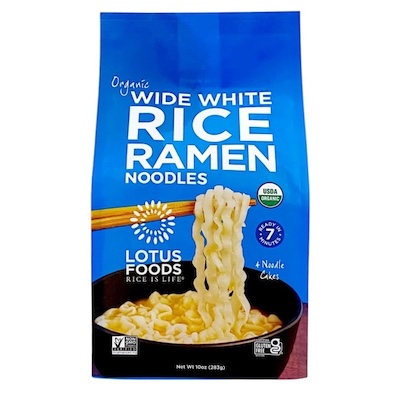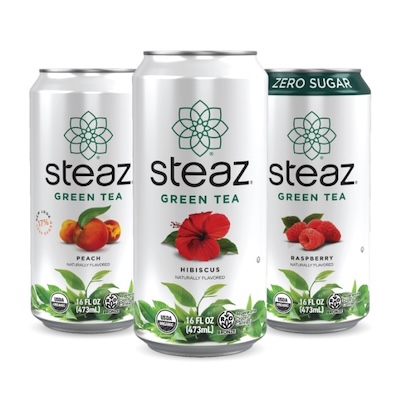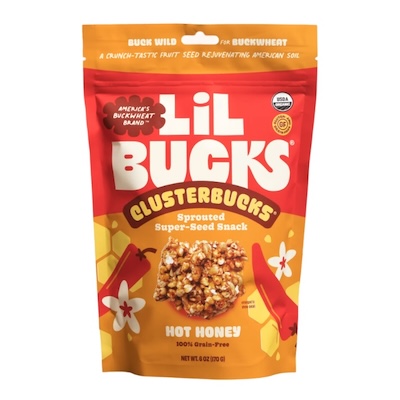
Federal Court Strikes Down USDA’s GMO Labeling Rule in Landmark Win for Consumers — What It All Means
How Organic Insider operates: We accept no advertising, we have no paywalls and we make our newsletters free to everyone because vital information about our industry needs to get out to as many people as possible. Please consider becoming an Organic Insider+ subscriber, whether you are an individual or a company. Thank you so much.
After nearly a decade of half-measures and loopholes, the fight for real GMO transparency has been given a second chance.
The other day, a decision from a U.S. Court of Appeals invalidated major portions of the USDA’s rule implementing the 2016 federal GMO-labeling law, known as the National Bioengineered Food Disclosure Standard. The ruling opens the door to a labeling system that finally works for consumers, instead of catering to the wishes of major food corporations.
The court held that the USDA acted unlawfully when it exempted ultra-processed or “highly refined” ingredients, such as corn and soy oils. The court also concluded that it was unlawful for the USDA to allow QR-code-only labels that required shoppers to scan packages just to see if GMOs were inside.
For consumers, it’s an enormous win.
“We’ve fought for decades for GMO labeling, as required by more than 60 other countries, and this is a landmark victory for the public’s right to know what they eat,” said George Kimbrell, legal director of the Center for Food Safety and lead counsel in the case.
Retailers on the front lines of consumer trust echoed that sentiment.
“This is a crucial step toward full honesty and transparency in food labeling,” said Mark Squire, co-owner and manager of Good Earth Natural Foods, one of the plaintiffs in the case.
KEY ASPECTS AND CONSIDERATION
The court’s ruling provided clarity on some fronts, while uncertainty remains on others.
A Win for Transparency: The decision holds unlawful the current “highly refined” loophole, which had allowed most GMO-derived oils, sugars and starches to go unlabeled to this point because they were not deemed to be “detectable” modified genetic material. This is a major setback for Big Food, as these GMO ingredients are estimated to appear in roughly 70% of all conventional food products.
End of QR-Code Labels Alone: The court vacated, or struck down, the USDA’s digital-only disclosure option. This was based on evidence from the USDA’s own study that it was discriminatory to many consumers, especially those in rural or low-income areas, who lack reliable smartphone access. Instead, an additional on-package label will now be required, something Big Food had long fought to avoid.
Name is Legal: Despite the fact that most consumers still have no idea what “bioengineered” means, its use was upheld by the court. However, the court clarified that both retailers and brands are nonetheless permitted to use the clearer, more familiar language such as “GMO,” “genetically modified” or “genetically engineered” alongside it — a small but significant win, as this was entirely unclear at the beginning of the case.
Rule Rewrite Ahead: Absent Supreme Court review, the USDA must now redo the rule to comply with the decision, but the timing of this is uncertain. It is also unclear how long Big Food will be allowed to continue selling its products under the now-invalidated rule, which will be decided by the lower court in the coming months.
A Chance to Include Next-Generation GMOs: The 2020 rule did not address GMO 2.0 technologies, such as gene editing and precision fermentation. This new court victory gives consumer advocates a second chance to ensure these next-generation technologies are included in the updated rule.
NEXT STEP: COLLABORATION AND COOPERATION
For those who participated in the GMO-labeling movement from 2012 to 2016, the level of cooperation and unity among organic advocates was unprecedented — and many believe that same spirit will be needed again.
“There is huge overlap with MAHA and those fighting against ultra-processed foods — which are the same highly refined bioengineered foods, just stated differently — and we need to lean into that and work together,” said Center for Food Safety’s George Kimbrell. “This is a hard-won opportunity where the baseline has been reset, and for the first time in years, the law is finally on the side of the people who read labels, not those who write them.”
 |
With gratitude, 
Max Goldberg, Founder |
Quick Hits
* Suja Life won Most Innovative Use of AI by a Brand at the Digiday AI Awards.
* Patagonia has just released its Work in Progress Report, the most comprehensive view of the company’s business impact, ownership structure and environmental giving that it has ever released.
* Nature’s Path is increasing its annual food donation commitment by $1.5 million, bringing this year’s total to more than $4 million.
* This is the final week to purchase the soil-grown (not hydroponic) Real Organic Project-certified, frozen blueberries from King Grove Organic Farm. Nationwide shipping.
* In California at Good Earth Natural Foods, how Regenerative Organic Certified® products are being prominently displayed.
* Mad Agriculture and Whole Foods Market are betting on bringing wildlife back to farms.
* Big Tree Farms has gone national with its line of Naughty Bali BBQ Sauces, all built on a base of organic Nira, a hand-harvested coconut blossom nectar.
* Organic certifier OneCert has just launched myOID, a resource to help verify the organic certification status of suppliers.
* Kelly Ryerson’s response to the egregious NYT op-ed, which argues that spraying Roundup on crops is perfectly fine.
* Iroquois Farmland Valley REIT is focusing on a hub strategy to help regenerative organic agriculture thrive.
* A recap of the 2025 San Diego Region Organic Agriculture Conference, a gathering organized by the University of California Organic Agriculture Institute.
* Lastly, a special tribute to the late Joan Gussow — a pioneering nutritionist, gardener and teacher.
New Organic Products
Wide White Rice Ramen Noodles from Lotus Foods
Lotus Foods has announced that its Organic Wide White Rice Ramen Noodles -- a single ingredient, first-of-its-kind innovation -- are now available in more than 3,400 stores nationwide, including Publix, Kroger, Sprouts and Harris Teeter. Additionally, these never-fried, naturally gluten-free noodles can be found at regional and specialty retailers, such as Heinen’s, Erewhon and Earth Fare.Regenerative Organic Certified® Ready-to-Drink Teas from Steaz
With a refreshed look and a partnership with Wild Orchard, Steaz has become the first Regenerative Organic Certified® ready-to-drink tea. It comes in five cane sugar–sweetened flavors (Peach, Blueberry-Pomegranate, Superfruit, Mint and Hibiscus) and three zero added sugar varieties (Zero Peach-Mango, Zero Raspberry, and Zero Half & Half). Available at Whole Foods Market, Sprouts and other leading natural retailers nationwide.Everything Bucks and Hot Honey Clusterbucks from Lil Bucks
Lil Bucks, which has built the first Regenerative Organic Certified® buckwheat supply chain in the U.S., has just introduced its first two savory flavors of Clusterbucks -- Hot Honey and Everything Bucks. These sprouted organic buckwheat snacks are gluten-free and grain-free, and they are available on the company's website, as well as retailers nationwide, including Whole Foods Market, HEB, Target and Jimbo's.Regenerative Organic Certified® Flours by Roaring Fork Mill
Winner of the Startup CPG’s inaugural Sustainability Shelfie Award and recipient of a USDA Business Builder Grant to strengthen regional grain supply chains, Roaring Fork Mill sells Regenerative Organic Certified® Flours. The artisan stone-milled baking flours, made from ancient and heritage wheats grown by farmers in Colorado and the Rocky Mountain West, come in varieties such as purple barley, all-purpose, spelt, emmer, rye and whole wheat.
Weekly News Summaries

Amazon unveils New Whole Foods Market Concept with Conventional Grocery Items
By Kelly Tyko
With shoppers being able to purchase 12,000 items from Amazon at this Whole Foods Market store in Philadelphia, its days as a pure "organic and natural" retailer may be coming to an end.
Bayer Weighs Roundup Exit as Cancer Legal Bill Nears $18 Billion
By Tim Loh, Hayley Warren and Julia Janicki
As a possible replacement to this toxic chemical, Bloomberg acknowledges the value of crop rotation regimens and the planting of cover crops to suppress weeds and add nutrients back to the soil.

European Parliament signals Approval of First-Ever EU Law on Soils
EU lawmakers rubber stamped the Soil Monitoring Law, the EU’s first ever law on soil health and an important milestone towards addressing Europe’s crisis of soil degradation.

Some Organic Farmers Skip Certification Amid Funding Uncertainty
By Laura Ullman
Because reimbursement under the federal organic certification cost-share program has stalled, several Vermont farms and processors are opting out of recertifying as organic this year.

Non-UPF Verified debuts Standard for CPG Brands
By Deniz Ataman
The Non-GMO Project’s new Non-UPF Verified standard requires packaged foods to comprise at least 70% minimally or moderately processed ingredients, limit added sugar and refined oils, and excludes synthetic biology and high-impact processing.

Tech Billionaires Back Gene-Edited ‘Designer Babies’ Startup
By Ariel Zilber
A Silicon Valley startup backed by OpenAI’s Sam Altman and Coinbase’s Brian Armstrong is pursuing research that some fear could lead to the birth of a genetically-engineered baby — a step that’s illegal under U.S. law and banned in most countries, a report said.

Supreme Court Considers Toxic Baby Food Lawsuit Involving Whole Foods Market
By Abbie VanSickle
Earth’s Best -- tainted with significant levels of toxic heavy metals, including arsenic, lead, cadmium and mercury -- is the subject of a Supreme Court lawsuit, and Whole Foods Market may have liability as well.

AI-Assisted Grocery Shopping: How Will This Change CPG Marketing?
By Elizabeth Crawford
According to PwC’s Carla DeSantis, approximately 40 % of grocery shoppers expect to use AI to compare products by 2030 and one-third will hand over purchasing decisions entirely, forcing CPG brands to rethink how they drive discovery beyond the shelf.
Want to share this newsletter on social media? You can use this link: Newsletter Link
The material in this newsletter is copyrighted and may be reprinted by permission only. All requests must be in writing. Please use our contact form to request republication rights.
Newsletter Archive
Quick Hits
* Suja Life won Most Innovative Use of AI by a Brand at the Digiday AI Awards.
* Patagonia has just released its Work in Progress Report, the most comprehensive view of the company’s business impact, ownership structure and environmental giving that it has ever released.
* Nature’s Path is increasing its annual food donation commitment by $1.5 million, bringing this year’s total to more than $4 million.
* This is the final week to purchase the soil-grown (not hydroponic) Real Organic Project-certified, frozen blueberries from King Grove Organic Farm. Nationwide shipping.
* In California at Good Earth Natural Foods, how Regenerative Organic Certified® products are being prominently displayed.
* Mad Agriculture and Whole Foods Market are betting on bringing wildlife back to farms.
* Big Tree Farms has gone national with its line of Naughty Bali BBQ Sauces, all built on a base of organic Nira, a hand-harvested coconut blossom nectar.
* Organic certifier OneCert has just launched myOID, a resource to help verify the organic certification status of suppliers.
* Kelly Ryerson’s response to the egregious NYT op-ed, which argues that spraying Roundup on crops is perfectly fine.
* Iroquois Farmland Valley REIT is focusing on a hub strategy to help regenerative organic agriculture thrive.
* A recap of the 2025 San Diego Region Organic Agriculture Conference, a gathering organized by the University of California Organic Agriculture Institute.
* Lastly, a special tribute to the late Joan Gussow — a pioneering nutritionist, gardener and teacher.




